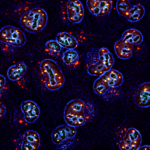Lien vers Pubmed [PMID] – 10597262
Oncogene 1999 Nov;18(47):6583-8
Several lines of evidence indicate that beta-catenin acquires oncogenic activity when its intracellular concentration increases as a result of either mutation in the beta-catenin gene itself or inactivation of the adenomatous polyposis coli (APC) gene. In an attempt to elucidate the molecular mechanisms underlying hepatocellular carcinogenesis, we have studied the frequency of beta-catenin gene alterations in exon 3, a region known to represent a mutation hot spot, and its inappropriate protein expression by immunohistochemistry in 73 hepatocellular carcinomas (HCCs). The results were correlated with different clinical and pathological data, particularly with the presence or not of an associated cirrhosis. Fourteen (19%) HCCs showed beta-catenin gene alterations with missense mutations in nine cases and interstitial deletions in five cases. These genetic alterations were present in both cirrhotic and non-cirrhotic groups. By contrast, we did not find any beta-catenin gene alterations in the nine fibromellar carcinomas we examined. Nuclear accumulation of the protein was observed in 18 of them (25%). Remarkably, these included ten of the 14 tumors harboring somatic mutations in the beta-catenin gene (P < 0.001). Our results indicate that accumulation of beta-catenin resulting from genetic mutations is a frequent event in non-fibrolamellar type hepatocellular carcinoma. The close association between increased beta-catenin protein stability and mutation indicates that immunohistochemistry may be a powerful method for the detection of the mutated protein in future clinical practice.

